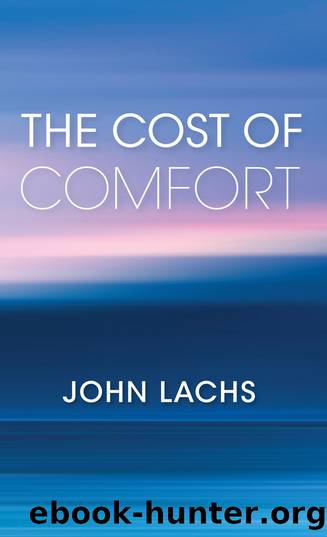The Cost of Comfort by John Lachs;

Author:John Lachs;
Language: eng
Format: epub
ISBN: 9780253043191
Publisher: Indiana University Press
Published: 2019-06-17T00:00:00+00:00
14Major Mediators
Tools
HUMANS ARE AMONG the most vulnerable animals. They are born defenseless and unable to take care of themselves. Unaided, their physical power is sharply limited; they don’t even enjoy the benefits of claws and fur. Without a measure of ingenuity, they would perish of the cold or of starvation. Their dependence at birth and their constant exposure to danger predisposes them to social life, which, though it demands self-control, offers protection and companionship.
To avoid frustration, suffering, and early death, humans interpose tools between themselves and what needs to be accomplished. Our ancestors used spears and stones to kill animals for food and for the warmth of their fur. Their intelligence motivated by fear, they developed clothing, protection for their feet, hatchets, projectiles, and hiding places. A tool is a physical object or event used to attain desired results. A hammer is such an object, and the song of birds is such an event. Hammers can be used to drive nails; birds use their song to attract a mate. This shows that nothing is intrinsically a tool; objects and events attain that status when they are put to use. On the operational side, therefore, people have to develop skills and habits of action that convert otherwise useless items into valuable instruments. Early humans had to learn how to throw stones, how to kill with a lance, and how to climb trees when the wounded animal attacks. Our situation is no different, except that the tools we use are more complex, and some of the skills necessary to operate them require more extensive training.
One could argue that tools are the quintessential mediators. We interpose them between ourselves and the tasks to be accomplished, sometimes to enhance security, at others to increase the range and power of our actions. We use physical objects to relieve ourselves of onerous tasks and heavy labor; properly employed, they can greatly increase the efficiency and efficacy of what the unaided body can do. The craftsman’s box of tools contains a marvelous selection of devices to construct or fix whatever a properly operating house may require. The great advantage of such tools is that whoever works with them knows their power and their limits. Craftsmen enjoy immediate acquaintance with their tools; they know what they are good for and what cannot be expected of them. As a result, control remains in the hands of the worker, and surprises are relatively rare.
Cheerleaders for humanity boldly assert that we are “the tool-using animal.” No other species is supposed to have the rationality to convert desires into goal-directed action; the fact that we can presumably provides added reason for supposing that we are the crown of creation. Such myths thrive on inattention. Most of us don’t watch and don’t notice what animals do. Purposive activity is present nearly everywhere in the animal kingdom, from chipmunks collecting corn for the winter to birds building their nests out of leaves and branches.
Never have I seen animal use of tools more clearly than one striking afternoon in the London Zoo.
Download
This site does not store any files on its server. We only index and link to content provided by other sites. Please contact the content providers to delete copyright contents if any and email us, we'll remove relevant links or contents immediately.
| Anthropology | Archaeology |
| Philosophy | Politics & Government |
| Social Sciences | Sociology |
| Women's Studies |
Nudge - Improving Decisions about Health, Wealth, and Happiness by Thaler Sunstein(7237)
iGen by Jean M. Twenge(5157)
The Fire Next Time by James Baldwin(5014)
Adulting by Kelly Williams Brown(4230)
The Hacking of the American Mind by Robert H. Lustig(4080)
The Sports Rules Book by Human Kinetics(4072)
The Ethical Slut by Janet W. Hardy(4036)
Captivate by Vanessa Van Edwards(3721)
Mummy Knew by Lisa James(3518)
In a Sunburned Country by Bill Bryson(3360)
The Worm at the Core by Sheldon Solomon(3324)
Ants Among Elephants by Sujatha Gidla(3278)
Suicide: A Study in Sociology by Emile Durkheim(2900)
The Slow Fix: Solve Problems, Work Smarter, and Live Better In a World Addicted to Speed by Carl Honore(2837)
The 48 laws of power by Robert Greene & Joost Elffers(2795)
Humans of New York by Brandon Stanton(2682)
Handbook of Forensic Sociology and Psychology by Stephen J. Morewitz & Mark L. Goldstein(2603)
The Happy Hooker by Xaviera Hollander(2580)
The Tipping Point by Malcolm Gladwell(2552)
